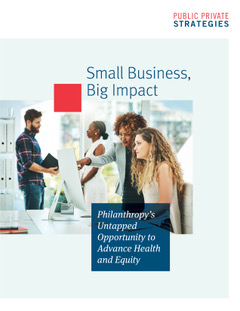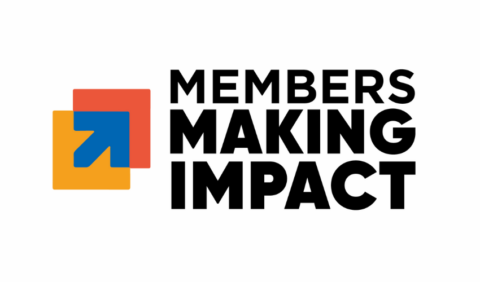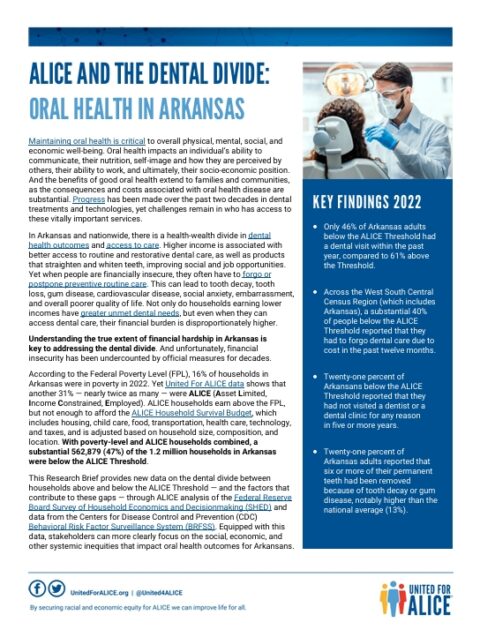Investing in Small Business Leaders to Promote Health and Wealth
By: Deborah Bae, the Robert Wood Johnson Foundation, Shuma Panse, the Robert Wood Johnson Foundation, & Rhett Buttle, Public Private Strategies
Increasingly, research shows that wealth is associated with improved health outcomes across a variety of indicators. People with more assets live longer, have lower rates of chronic disease and have better mental health. So it would make sense for funders and philanthropic actors focused on improving health to be mindful of how they can also seek to increase wealth. Indeed, foundations like the Robert Wood Johnson Foundation have begun to incorporate more of a focus on financial security into their efforts to promote advance health and equity.Yet, one critical constituency has traditionally been overlooked by those who work to improve health and wealth outcomes across the country despite their strong link to wealth, especially for communities of color. That constituency is small business owners.
Small business owners are trusted leaders in their communities and small business ownership is also one of the best ways for individuals to build wealth and financial stability. On average, business-owning households hold more than twice the wealth of their wage-earning peers. Not only is business ownership a powerful path to wealth creation, it’s also an important factor in narrowing the racial wealth gap. Black business owners are, on average, more than seven times wealthier than their wage-earning peers. Similarly, Latinx business owners hold roughly four times as much wealth as non-business owners. Overall, white adults hold 13 times the net assets of their black peers on average, yet this racial wealth gap falls to just a threefold differential when comparing business owners by race.
To explore the role small business owners could play in improving health, equity and economic inclusion, Public Private Strategies undertook at year-long research project funded by the Robert Wood Johnson Foundation. As part of this work, we conducted close to 100 interviews with small business leaders, philanthropic and ecosystem actors across the country. The research found that most of the current work to incorporate business into strategies has largely focused on big business. This ignores the enormous impact small businesses have on the financial health of millions of Americans and their powerful potential to promote healthy, equitable, and economically inclusive communities. Indeed, nearly 100 million people either own or work for a small business, and 43% of small businesses are located in low-wealth communities. These businesses generate income, jobs and wealth, improving financial security in ways that can directly impact the health of a community.
Increasing business ownership, particularly among communities of color, could be one of the clearest ways to increase wealth and in turn improve health and wealth outcomes.There are significant opportunities in this space for funders from all fields — health, asset building, racial equity and inclusive economic development. Our research has shown that many foundations leaders are interested in engaging small business but often don’t know where to start. Our report tackles this and lays out recommendations and avenues for engaging small business in the work of advancing health, equity and inclusive communities.You can read more about the seven ways to engage small businesses – including some examples from partners who already leading the way.
Check out the report, Small Business, Big Impact: Philanthropy’s Untapped Opportunity to Advance Health and Equity.
Deborah Bae, Senior Program Officer, Robert Wood Johnson Foundation
Deborah Bae, MPA, MBA, joined the Foundation in 2005 and is interested in finding innovative health solutions from around the world to improve health care in the United States and the role of design in improving health outcomes. Previously, Deborah worked in the N.Y.C. Department of Health Bureau of Informatics and Data Services, helping to implement an electronic disease reporting system for all New York City hospitals and laboratories.
Rhett Buttle, Founder, Public Private Strategies
Rhett Buttle is an expert working at the nexus of policy and market change. He is the founder of Public Private Strategies and Next Gen Chamber of Commerce. Rhett previously served as a private sector advisor to the Secretary of Health & Human Services and The White House Business Council. He is a Senior Fellow at the Aspen Institute Financial Security Program.
Shuma Panse, Senior Program Officer, Robert Wood Johnson Foundation
Shuma Panse joined the Robert Wood Johnson Foundation in February 2016, bringing extensive experience in business engagement on health, public-private partnerships, and global health. Previously, Panse was director of global programs at GBCHealth, a New York City- headquartered business coalition of 200 companies addressing health issues in low- and middle-income countries. Shuma’s prior work experiences include a fellowship at the U.S. Centers for Disease Control and Prevention (CDC), the U.S. Peace Corps, health departments in New York City, Massachusetts and Louisiana, and several community-based organizations.
Check out the report: Small Business, Big Impact: Philanthropy’s Untapped Opportunity to Advance Health and Equity.



